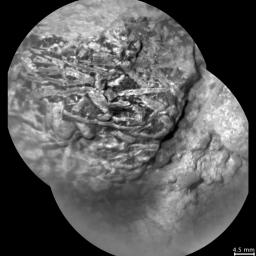
|
Crystal-Laden Martian Rock Examined by Curiosity’s Laser Instrument
- Click the image above for a larger view
- Full-Res JPEG (1320 x 1320) (145.7 kB)
- Full-Res TIFF (1320 x 1320) (1.7 MB)
Caption:
As NASA's Mars rover Curiosity is progressing toward Mount Sharp, researchers are using the rover's instruments to examine soils and rocks in Gale Crater. On the mission's 514th sol, or Martian day (Jan. 15, 2014) the Chemistry and Camera (ChemCam) instrument examined a rock target called "Harrison" with its Remote Micro-Imaging (RMI) camera and its laser. This is an RMI image of the rock, which is loose on the surface inside Gale Crater, not part of an outcrop.
Harrison contains elongated, light-colored crystals in a darker matrix. The 4.5-millimeter scale bar at lower right is about one-sixth of an inch long. Some of the crystals are up to about 0.4 inch (1 centimeter) in size.
The RMI and ChemCam's laser were about 7.5 feet (2.3 meters) from the target. At that distance, the laser can sample areas less than 0.016 inch (0.4 millimeter) in diameter. Thanks to this small sampling area, ChemCam provides constraints on the composition of each constituent in the rock: The elongated crystals are likely feldspars, while the matrix is pyroxene-dominated, an association typical of basaltic igneous rocks. This texture provides compelling evidence for igneous rocks at Gale Crater.
Background Info:
More information about Curiosity is online at http://www.nasa.gov/msl and http://mars.jpl.nasa.gov/msl/ .
Cataloging Keywords:
| Name | Value | Additional Values |
|---|---|---|
| Target | Mars | |
| System | ||
| Target Type | Planet | |
| Mission | Mars Science Laboratory (MSL) | |
| Instrument Host | Curiosity Rover | |
| Host Type | Rover | |
| Instrument | Chemistry & Camera (ChemCam) | |
| Detector | ||
| Extra Keywords | Crater, Grayscale | |
| Acquisition Date | ||
| Release Date | 2014-01-29 | |
| Date in Caption | 2014-01-15 | |
| Image Credit | NASA/JPL-Caltech/LANL/CNES/IRAP/LPGNantes/CNRS/IAS | |
| Source | photojournal.jpl.nasa.gov/catalog/PIA17767 | |
| Identifier | PIA17767 | |
